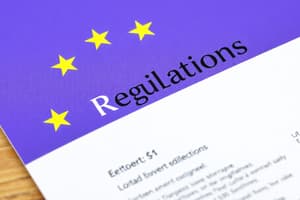Podcast
Questions and Answers
What is the main action the applicant is seeking from the Court?
What is the main action the applicant is seeking from the Court?
- To annul the contested decision (correct)
- To require the Commission to apologize
- To dismiss the action against her
- To extend her diplomatic status
When did the applicant claim her diplomatic status began?
When did the applicant claim her diplomatic status began?
- 1 May 2009
- 22 September 2000
- 22 September 2010 (correct)
- 16 June 2013
What plea does the applicant raise in relation to her diplomatic status?
What plea does the applicant raise in relation to her diplomatic status?
- Alleging a violation of privacy rights
- Seeking increased diplomatic privileges
- Alleging infringement of Article 4(1)(a) of Annex VII (correct)
- Challenging employment terms in Belgium
What concept is the second part of the applicant's plea related to?
What concept is the second part of the applicant's plea related to?
What date did the applicant surrender her diplomatic passport?
What date did the applicant surrender her diplomatic passport?
What does the Commission argue should be the outcome of the Court's proceedings?
What does the Commission argue should be the outcome of the Court's proceedings?
What significant effect would excluding the applicant's diplomatic status period have had?
What significant effect would excluding the applicant's diplomatic status period have had?
What event took place on 9 July 2019?
What event took place on 9 July 2019?
What is the presumed effect of work performed in another State or for an international organization on the individual’s ties to the State of employment?
What is the presumed effect of work performed in another State or for an international organization on the individual’s ties to the State of employment?
Why is the period relating to work done for another State or international organization excluded from consideration?
Why is the period relating to work done for another State or international organization excluded from consideration?
What privileges and immunities did the applicant claim to benefit from?
What privileges and immunities did the applicant claim to benefit from?
According to previous judgments, to whom does the provision regarding circumstances arising from work done for another State apply?
According to previous judgments, to whom does the provision regarding circumstances arising from work done for another State apply?
In the case of De Angelis v Commission, what distinguishes the party concerned from the applicant?
In the case of De Angelis v Commission, what distinguishes the party concerned from the applicant?
What is implied about the applicant's diplomatic status concerning her ties to the State of employment?
What is implied about the applicant's diplomatic status concerning her ties to the State of employment?
What legal framework does the applicant cite to support her claims?
What legal framework does the applicant cite to support her claims?
How does the applicant interpret her diplomatic status in relation to Article 4(1)(a) of the Staff Regulations?
How does the applicant interpret her diplomatic status in relation to Article 4(1)(a) of the Staff Regulations?
What does the applicant argue regarding directing discussion groups?
What does the applicant argue regarding directing discussion groups?
How does the Commission view the applicant's activity of directing discussion groups?
How does the Commission view the applicant's activity of directing discussion groups?
What does Article 4(1)(a) of Annex VII to the Staff Regulations include?
What does Article 4(1)(a) of Annex VII to the Staff Regulations include?
Which of the following judgments illustrate the application of the occupation criterion in the Staff Regulations?
Which of the following judgments illustrate the application of the occupation criterion in the Staff Regulations?
What significant event happened to the applicant on 16 June 2013?
What significant event happened to the applicant on 16 June 2013?
What distinguishes the legal position of the applicant from that of her husband?
What distinguishes the legal position of the applicant from that of her husband?
Why is the Vienna Convention on Consular Relations considered irrelevant in this case?
Why is the Vienna Convention on Consular Relations considered irrelevant in this case?
What concept is examined in relation to the expatriation of the husband and wife?
What concept is examined in relation to the expatriation of the husband and wife?
How does the applicant argue about the expatriation of diplomatic agents versus their spouses?
How does the applicant argue about the expatriation of diplomatic agents versus their spouses?
What is implied as a key factor in the concept of expatriation?
What is implied as a key factor in the concept of expatriation?
What does the applicant claim regarding her husband's integration compared to hers?
What does the applicant claim regarding her husband's integration compared to hers?
In what manner is the status of the applicant and her husband considered different?
In what manner is the status of the applicant and her husband considered different?
What might hinder a diplomatic agent's spouse from forming ties to their host country?
What might hinder a diplomatic agent's spouse from forming ties to their host country?
What argument cannot the applicant successfully make regarding her husband's recruitment?
What argument cannot the applicant successfully make regarding her husband's recruitment?
How does expatriation relate to diplomatic status according to the content?
How does expatriation relate to diplomatic status according to the content?
What was determined as the reference period for the applicant?
What was determined as the reference period for the applicant?
What must be true for the applicant to be considered under the expatriation allowance?
What must be true for the applicant to be considered under the expatriation allowance?
What was rejected in the applicant's plea?
What was rejected in the applicant's plea?
Why was the applicant's plea regarding diplomatic status not favored?
Why was the applicant's plea regarding diplomatic status not favored?
What was the main reason for the AECE's decision regarding the reference period?
What was the main reason for the AECE's decision regarding the reference period?
What role does habitual residence play in the applicant's plea?
What role does habitual residence play in the applicant's plea?
What is the concept of habitual residence primarily based on?
What is the concept of habitual residence primarily based on?
Which of the following indicates the applicant's integration into Belgium?
Which of the following indicates the applicant's integration into Belgium?
Why does the payment of accommodation costs by the Republic of Poland not negate the applicant's integration?
Why does the payment of accommodation costs by the Republic of Poland not negate the applicant's integration?
What does the applicant's participation in the voluntary sector signify?
What does the applicant's participation in the voluntary sector signify?
In legal terms, how is 'residence' defined beyond merely living in a place?
In legal terms, how is 'residence' defined beyond merely living in a place?
What is meant by the 'habitual center of interests'?
What is meant by the 'habitual center of interests'?
Which aspect is least likely to influence the assessment of habitual residence?
Which aspect is least likely to influence the assessment of habitual residence?
Following the return of her husband to Poland, what was a key reason for the applicant to stay in Belgium?
Following the return of her husband to Poland, what was a key reason for the applicant to stay in Belgium?
Flashcards
Applicant's Reply Date
Applicant's Reply Date
The applicant submitted their response on February 14, 2019.
Commission's Rejoinder Date
Commission's Rejoinder Date
The Commission responded to the applicant's reply on April 1, 2019.
Court's Oral Procedure
Court's Oral Procedure
The court scheduled a hearing and asked questions to both parties which were answered during the hearing on July 9, 2019.
Applicant's Claim
Applicant's Claim
Signup and view all the flashcards
Commission's Counter-Claim
Commission's Counter-Claim
Signup and view all the flashcards
Infringement of Article 4(1)(a)
Infringement of Article 4(1)(a)
Signup and view all the flashcards
Diplomatic Status Period
Diplomatic Status Period
Signup and view all the flashcards
Habitual Residence Claim
Habitual Residence Claim
Signup and view all the flashcards
Diplomatic status in employment
Diplomatic status in employment
Signup and view all the flashcards
Vienna Convention on Diplomatic Relations
Vienna Convention on Diplomatic Relations
Signup and view all the flashcards
Article 4(1)(a) Annex VII Staff Regulations
Article 4(1)(a) Annex VII Staff Regulations
Signup and view all the flashcards
De Angelis v Commission (246/83)
De Angelis v Commission (246/83)
Signup and view all the flashcards
Work in another state/international organization
Work in another state/international organization
Signup and view all the flashcards
Quadri di Cardano v Commission (T-273/17)
Quadri di Cardano v Commission (T-273/17)
Signup and view all the flashcards
Circumstances arising from work
Circumstances arising from work
Signup and view all the flashcards
Sufficient integration (to a State)
Sufficient integration (to a State)
Signup and view all the flashcards
Expatriation Concept
Expatriation Concept
Signup and view all the flashcards
Diplomatic Status Impact on Expatriation
Diplomatic Status Impact on Expatriation
Signup and view all the flashcards
Spouse's Expatriation
Spouse's Expatriation
Signup and view all the flashcards
Applicant's Argument: Expatriation and Work
Applicant's Argument: Expatriation and Work
Signup and view all the flashcards
Occupation as Proof of Integration
Occupation as Proof of Integration
Signup and view all the flashcards
Occupation Criterion: Objective but Not Absolute
Occupation Criterion: Objective but Not Absolute
Signup and view all the flashcards
Integration beyond Work
Integration beyond Work
Signup and view all the flashcards
Surrendering Diplomatic Passport = Registration
Surrendering Diplomatic Passport = Registration
Signup and view all the flashcards
Diplomatic Status vs. Integration
Diplomatic Status vs. Integration
Signup and view all the flashcards
Expatriation Allowance
Expatriation Allowance
Signup and view all the flashcards
Diplomatic Status
Diplomatic Status
Signup and view all the flashcards
Habitual Residence
Habitual Residence
Signup and view all the flashcards
Reference Period
Reference Period
Signup and view all the flashcards
Time During Diplomatic Status
Time During Diplomatic Status
Signup and view all the flashcards
Applicant's Argument
Applicant's Argument
Signup and view all the flashcards
Court's Decision
Court's Decision
Signup and view all the flashcards
Key Difference
Key Difference
Signup and view all the flashcards
Integration
Integration
Signup and view all the flashcards
What determines habitual residence?
What determines habitual residence?
Signup and view all the flashcards
Material Advantages
Material Advantages
Signup and view all the flashcards
Social Relations
Social Relations
Signup and view all the flashcards
Example of Integration: Schooling
Example of Integration: Schooling
Signup and view all the flashcards
Example of Integration: Volunteering
Example of Integration: Volunteering
Signup and view all the flashcards
Factors Considered for Integration
Factors Considered for Integration
Signup and view all the flashcards
Study Notes
Judgment of the General Court (Fifth Chamber) - 28 November 2019
- Case: T-592/18, Katarzyna Wywiał-Prząda v European Commission
- Applicant: Katarzyna Wywiał-Prząda, a Polish national residing in Belgium
- Defendant: European Commission
- Dispute: Refusal to grant expatriation allowance (23 November 2017)
- Issue: Whether the applicant is entitled to an expatriation allowance based on her diplomatic status and work for another state
Background to the Dispute
- Applicant arrived in Belgium in 2010, accompanying her husband who worked as a diplomatic advisor to the Polish delegation of NATO
- Held a diplomatic passport, from July 2010
- Worked for the Polish representation to the EU (January 2011 - December 2011)
- Later worked for two Belgian companies that contractually worked for the EU (June 2014 - August 2017)
- Recruited by the EU Commission in September 2017
- Husband returned to Poland September 2016
Procedure
- Application lodged at the court registry in September 2018
- Commission lodged its defense in December 2018
- Applicant lodged a reply in February 2019
- Commission lodged a rejoinder in April 2019
- Oral arguments presented in July 2019
Law
-
Expatriation allowance: Article 4(1)(a) of Annex VII to the Staff Regulations
- Applies to officials who are not nationals of the state in whose territory they work and haven't habitually resided or carried on their main occupation in that state for 5 years prior
- Excludes time spent working for another state or international organization
-
Habitual residence: The length of time the applicant lived in Belgium was a deciding factor, and whether it was permanent or temporary. Documents suggest that this was not a deciding factor, as it was not explicitly stated in the case.
-
Diplomatic status: The applicant enjoyed diplomatic status until June 2013.
-
Vienna Convention: The applicant argued that her status as a spouse of a diplomatic agent meant she benefited from the privileges and immunities under the Vienna Convention, which should exempt the time from the calculation of the reference period.
-
Expatriation: The court determined that the applicant didn't meet the conditions for claiming the allowance because her stay was not a continuous or permanent type of residence
Judgment
- The application was dismissed
- The applicant was ordered to pay costs
Studying That Suits You
Use AI to generate personalized quizzes and flashcards to suit your learning preferences.




